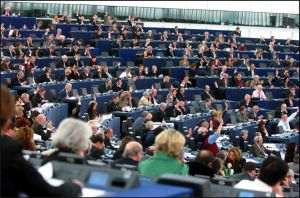It"s so hot, that the General Shareholder Meeting of the BSE scheduled for tomorrow may not even be held. There are three items on the agenda, of which the only ones to incite any interest are the payout of dividends by halving the share capital.
The other two items - the merger with Sibex and the introduction of the mandatory use of cumulative voting, in the case of the dismissal of the majority of the members of the Board of the Exchange - are surrounded by the same apathy that lingered around them in the previous general shareholder meeting, which didn"t even meet the quorum.
There will be no more attempts to start a revolution, because, after all, who ever heard of a revolution started by people sitting on the beach in their swim trunks?!
If it wasn"t for the dividend thing, I"d be willing to bet that the General Shareholder Meeting will not be held.
However, if it held, the reduction of the share capital of the BSE will be approved (money!, money!, show me the money!).
There was no one to present a plan for growing the BSE, to invest all that money lying dormant. The only idea, proposed by the managing director of the BSE, namely the acquisition of a smaller exchange in the region, didn"t spark anybody"s enthusiasm (the truth is we can barely handle the one we have).
The halving of the share capital eliminates this idea (let"s forget about it!) and will result in a reduction of the stock market capitalization of the BSE to a degree that can not predicted, as even the staff of the BSE admit.
The topic of the merger with Sibex, which would hold the frontpage some time ago, nearly got excluded from the agenda, because four out of the nine members of the Board voted against it.
The very promoter of the idea - Siminel Andrei - was against scheduling the vote for the approval on principle of the merger with Sibiu, together with the president of the BSE Stere Farmache, the vice-president of the BSE Mircea Botta and newcomer on the Board Grzegorz Konieczny (by the way the PR agency of "Franklin Templeton"-Romania, sent us a fragment of the Note displayed on the website of the BSE, to show us that Konieczny voted against the item of the merger and stressed that "the members of the Board of Directors of the BSE who hold shares of Sibex (directly or indirectly) have an obvious conflict of interest and shouldn"t vote on any decision of the Board of the Exchange concerning Sibex"; what their PR agency doesn"t tell us is how did Konieczny vote on the item of the reduction of the BSE"s share capital, a topic which his direct boss, Mark Mobius, said he didn"t know had the backing of Konieczny).
The fact that Siminel Andrei voted against the idea that he had promoted in the first place, made us curious enough to ask him for an explanation:
"I have actively participated in the merger between the BSE and the RASDAQ, I was the one who initiated the idea of the merger/acquisition of the Sibiu Exchange, but it took me many years to understand and appreciate the need to preserve competition", Andrei said, and he went on to say:
"The Sibiu Exchange grew the derivatives market out of nothing, something which seems to be impossible for the BSE, even though it had resources which were tens of times greater! Why? Because as they grow, companies become bureaucratic and their management becomes inefficient. If we were to merge the two exchanges, all we would be doing would be to kill the free entrepreneurial spirit, which is still in charge in Sibiu and replace it with the complacency of the BSE. If we had succeeded in executing the merger 5-6 years ago, today we wouldn"t have a derivatives market in Sibiu."
It is interesting that Mircea Botta voted against the merger, just like Siminel Andrei did, but did so for completely different reasons: Botta wants the merger, but he is concerned that the idea would be rejected by the General Shareholder Meeting, because, as he explained to us, this is not a good time to approach this subject (Note: - the CNVM has been procrastinating the validation of the new Board of Directors of Sibex, which was older than the "super-new" one and no-one can figure out what"s happening in Sibex right now).
"When would we ever succeed in including the merger on the agenda of a General Shareholder Meeting again, if we were to reject the merger this time?", Botta wondered.
And last but not least, the topic of the cumulative voting is just another pointless soap-opera, because making it required "in the case of the revocation of the majority of the members of the Board", which is the amendment that the Board would like to include in the Bylaws, disregards the fact that the revocation of the majority of the members of the Board basically leads to general elections.
I repeat: to make sure this General Shareholder Meeting would actually be held, it would have to be held in Eforie Nord.
What the hell, the week-end is coming!
A.3 Implications concerning the "image" of the BSE: In the first years after it became a joint stock company, the BSE opted for capitalizing its profits and issuing "free shares". A radical change of such a policy could raise questions and that is why it is mandatory that the decision to reduce the share capital be convincingly explained to the public.
A.4 Implications concerning the "strategic positioning": The reduction of the share capital and of its equity can reduce the "competitive aggressiveness" of the BSE, turns it into a an easy target in the event of a takeover and could represent an additional incentive for potential mergers, since the share conversion rate in the event of a merger would be unfavorable to the BSE under the new conditions. Also, with a visibly lower level of its own capital, the question could arise whether the BSE would still find it viable to support some of the companies or institutions in the BSE Group which are traditionally posting losses.
A.5 Implications on the management: Reducing the financial resources of the BSE would significantly lower the financial resources of the BSE. Thus, in order to maintain profitability, this will put additional pressure on management to increase operating revenues and/or to lower costs (which, missing a more innovative approach, would involve layoffs, wage and bonus cuts etc.).
(Excerpt from the document published on the website of the BSE: "NOTE concerning the reduction of the share capital".)
•
Grzegorz Konieczny, director of the BSE, explained the main reasons why he voted against putting the merger on the Agenda of Friday"s general shareholder meeting: "The main reason was the absence of a study on the benefits that a potential merger would bring to the BSE. Also, the terms of the merger were not presented (for instance the conversion for the two stocks etc.) Without such details, a decision for or against a merger is impossible to make".








































